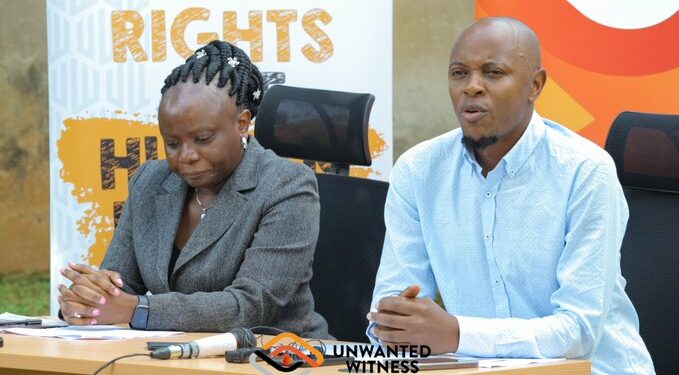Unwanted Witness, a prominent advocacy organization, this week released a comprehensive position paper calling on the government to review and amend the Registration of Person Acts and remove mandatory use of National Identity Cards.
The position paper titled “Championing an Inclusive, Trustworthy, and Accountable Approach to Uganda’s ID Infrastructure and the Transition to a New Generation ID,” also demands that the government reduces replacement and error correction charges, it also demands the allocation of adequate resources to NIRA.
The release coincides with Uganda’s mass registration campaign for the renewal of national IDs this July, a critical time for the nation’s identification system.
The document provides an in-depth analysis of Uganda’s National ID System, with a particular focus on the National Security Identification System (NSIS) and the emerging New Generation National ID Project, known locally as Ndaga Muntu.
It also scrutinizes the National Identification and Registration Authority (NIRA), highlighting significant shortcomings within the NSIS and advocating for a more transparent, inclusive, and accountable identification framework.
Among the key issues raised in the position paper are substantial human rights concerns related to Uganda’s ID infrastructure, specifically regarding privacy, financial strain, and the exclusion of marginalized populations. The paper traces the developmental trajectory of the NSIS, outlining its obstacles and progress while critically evaluating NIRA’s effectiveness in citizen registration and data consolidation.
Addressing journalists at their headquarters in Kampala, Freda Nalumansi-Mugambe, Research and Advocacy Lead at Unwanted Witness revealed that many Ugandans face significant barriers in accessing essential services due to the current National ID system, therefore removing it as a mandatory requirement for one to access services or job opportunities will help the marginalized population that has no national ID.
“Our analysis shows that the mandatory nature of these IDs, without viable alternatives, leads to the exclusion of many from critical activities such as healthcare, employment, and financial transactions.”
The paper shows the barriers preventing inclusivity are multifaceted and collectively hinder the efficiency, transparency, and accessibility of their services. These barriers, if left unaddressed, can have significant implications for citizens’
rights, service quality, and the overall effectiveness of the identification system hence, exclusion matters can be explored from various viewpoints; ranging from legal parameters to financial and technical challenges.
“Privacy concerns are at the forefront of our findings,” emphasized Anthony Odur, one of the main researchers. “NIRA’s failure to comply with Uganda’s Data Protection Laws, such as conducting a Data Protection Impact Assessment or having a privacy policy, poses significant risks to the privacy rights of citizens.”
He asserts that the Registration of Persons Act, of 2015 inadequately delineates robust privacy safeguards in the processing of personal data, thus failing to establish efficacious monitoring mechanisms. This deficiency engenders apprehension regarding the identity of data assessors, the modalities of data storage, and subsequent data utilization, thereby necessitating urgent regulatory scrutiny and rectification.
Cost of ID Replacement
Uganda, classified as one of the world’s poorest nations, has a significant portion of its population living below the poverty line. The steep fixed fee of UGX 50,000/- (approximately USD 13.78) for ID replacement imposes a heavy financial burden on many citizens, especially when compared to neighbouring countries with lower fees.
Although the recent announcement waiving ID renewal fees is a positive step, the high costs associated with ID replacement and error correction remain a significant challenge for the average Ugandan.
The position paper presents a comparative analysis of ID replacement fees in neighbouring countries, highlighting the disproportionate financial burden placed on Ugandans. It recommends urgent reforms to enhance the inclusivity and affordability of the National ID system, emphasizing the need for a more equitable and human rights-respecting approach.
“Unwanted Witness is calling on stakeholders, policymakers, and the Ugandan government to prioritize reforms that ensure the National ID system is inclusive, trustworthy, and accountable. This involves addressing privacy concerns, reducing financial burdens, and ensuring no Ugandan is excluded from essential services due to the lack of an ID,” said Mis Nalumansi.
On top of these monetary concerns, Regulation 23 in the Registration of Persons Regulations SI 67 of 2015 introduces punitive fines for individuals who fail to renew their national ID, with the potential for a maximum daily penalty of 40,000/=, aiming more at punishment than encouraging compliance.
Unwanted Witness Uganda assert that this punitive approach exacerbates the marginalization of vulnerable individuals and contravenes the principles of identification that emphasize that costs should never be a barrier to obtaining identity credentials required to fulfill rights or access essential services and entitlements.
“As the mass registration campaign progresses, the findings and recommendations outlined in this position paper are expected to play a crucial role in shaping the future of Uganda’s National ID infrastructure. The call for an inclusive, trustworthy, and accountable system resonates with the need for a more equitable approach to citizen identification, highlighting the importance of protecting human rights and ensuring access for all,” she added.
Meanwhile, they recommended that the government through Parliament evoke the Minister’s powers under Section 8 of the Registration of Persons Act, 2015, and direct the reduction of the cost of replacement fee structure substantially to at least $4 US dollars or exemptions for marginalized and low-income individuals.
Alluding that this approach would alleviate the financial burden on disadvantaged groups, promoting inclusivity and ensuring that replacement fees do not disproportionately affect those struggling with poverty.
They also called for the introduction of provisions for alternative identification options, such as temporary IDs, for individuals facing challenges in obtaining a National ID also known as Ndaga Muntu to prevent exclusion from accessing essential services.
They urged the government to review existing regulations to ensure that non-nationals, including refugees and asylum seekers, are not subject to discriminatory practices. Simplify and make the identification process more accessible for this group.
The paper also called for an amendment of Section 66 of the Act not to make the use of identification cards a prerequisite for accessing public/ basic essential services and provide for other forms of identification to minimize exclusion to ensure no one is left behind and as the ID infrastructure evolves to universal access.
Do you have a story in your community or an opinion to share with us: Email us at editorial@watchdoguganda.com













